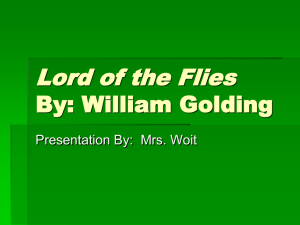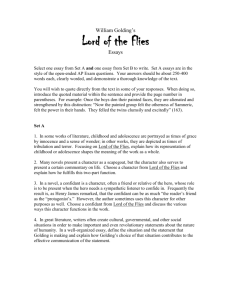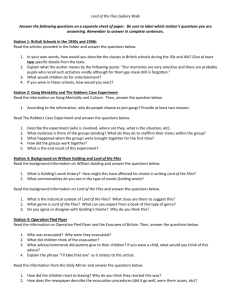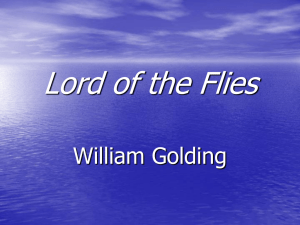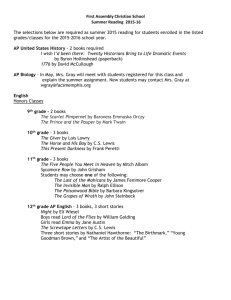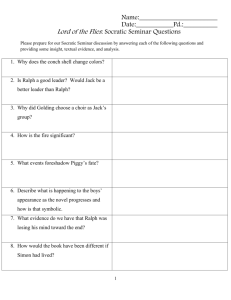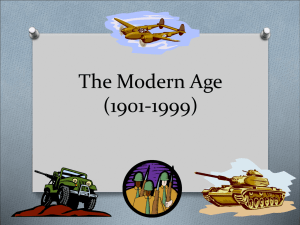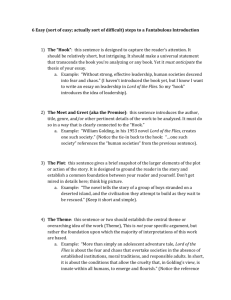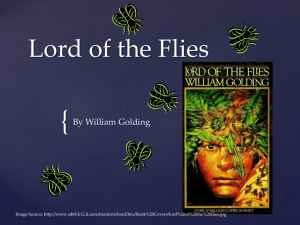William Golding - Biography
advertisement
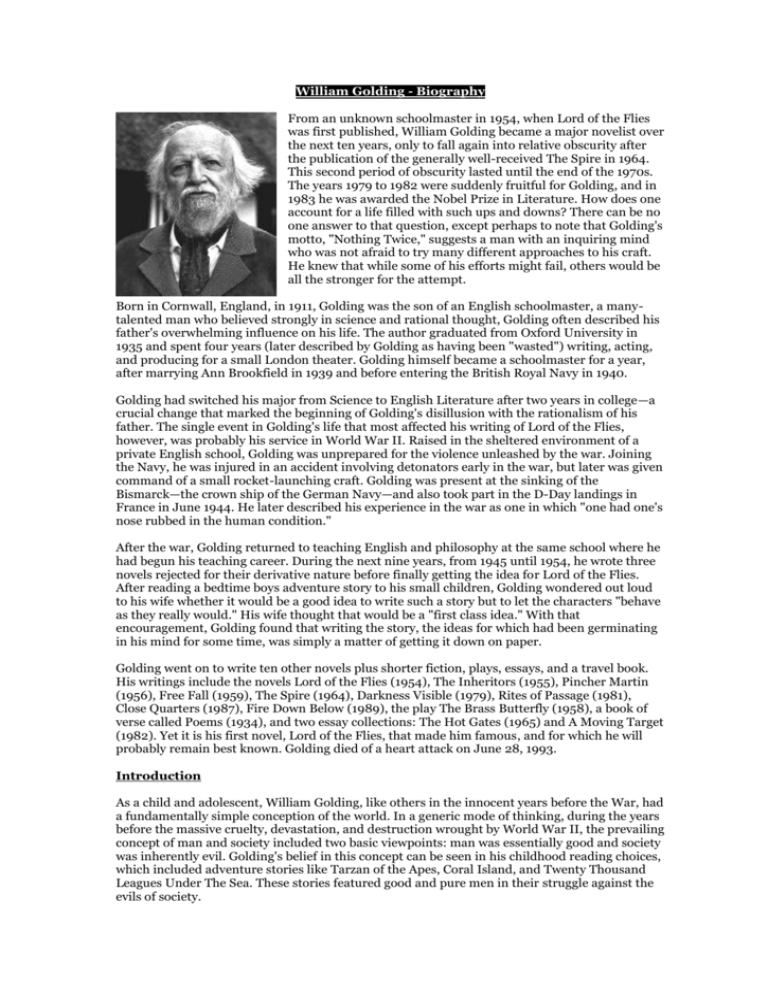
William Golding - Biography From an unknown schoolmaster in 1954, when Lord of the Flies was first published, William Golding became a major novelist over the next ten years, only to fall again into relative obscurity after the publication of the generally well-received The Spire in 1964. This second period of obscurity lasted until the end of the 1970s. The years 1979 to 1982 were suddenly fruitful for Golding, and in 1983 he was awarded the Nobel Prize in Literature. How does one account for a life filled with such ups and downs? There can be no one answer to that question, except perhaps to note that Golding's motto, "Nothing Twice," suggests a man with an inquiring mind who was not afraid to try many different approaches to his craft. He knew that while some of his efforts might fail, others would be all the stronger for the attempt. Born in Cornwall, England, in 1911, Golding was the son of an English schoolmaster, a manytalented man who believed strongly in science and rational thought, Golding often described his father's overwhelming influence on his life. The author graduated from Oxford University in 1935 and spent four years (later described by Golding as having been "wasted") writing, acting, and producing for a small London theater. Golding himself became a schoolmaster for a year, after marrying Ann Brookfield in 1939 and before entering the British Royal Navy in 1940. Golding had switched his major from Science to English Literature after two years in college—a crucial change that marked the beginning of Golding's disillusion with the rationalism of his father. The single event in Golding's life that most affected his writing of Lord of the Flies, however, was probably his service in World War II. Raised in the sheltered environment of a private English school, Golding was unprepared for the violence unleashed by the war. Joining the Navy, he was injured in an accident involving detonators early in the war, but later was given command of a small rocket-launching craft. Golding was present at the sinking of the Bismarck—the crown ship of the German Navy—and also took part in the D-Day landings in France in June 1944. He later described his experience in the war as one in which "one had one's nose rubbed in the human condition." After the war, Golding returned to teaching English and philosophy at the same school where he had begun his teaching career. During the next nine years, from 1945 until 1954, he wrote three novels rejected for their derivative nature before finally getting the idea for Lord of the Flies. After reading a bedtime boys adventure story to his small children, Golding wondered out loud to his wife whether it would be a good idea to write such a story but to let the characters "behave as they really would." His wife thought that would be a "first class idea." With that encouragement, Golding found that writing the story, the ideas for which had been germinating in his mind for some time, was simply a matter of getting it down on paper. Golding went on to write ten other novels plus shorter fiction, plays, essays, and a travel book. His writings include the novels Lord of the Flies (1954), The Inheritors (1955), Pincher Martin (1956), Free Fall (1959), The Spire (1964), Darkness Visible (1979), Rites of Passage (1981), Close Quarters (1987), Fire Down Below (1989), the play The Brass Butterfly (1958), a book of verse called Poems (1934), and two essay collections: The Hot Gates (1965) and A Moving Target (1982). Yet it is his first novel, Lord of the Flies, that made him famous, and for which he will probably remain best known. Golding died of a heart attack on June 28, 1993. Introduction As a child and adolescent, William Golding, like others in the innocent years before the War, had a fundamentally simple conception of the world. In a generic mode of thinking, during the years before the massive cruelty, devastation, and destruction wrought by World War II, the prevailing concept of man and society included two basic viewpoints: man was essentially good and society was inherently evil. Golding's belief in this concept can be seen in his childhood reading choices, which included adventure stories like Tarzan of the Apes, Coral Island, and Twenty Thousand Leagues Under The Sea. These stories featured good and pure men in their struggle against the evils of society. Golding's opinions toward mankind and society changed with the course of the war. He fought during World War II as a member of the Royal Navy. His experience included clashes with enemy naval vessels as well as participation in the Walcheren and D-Day operations. He witnessed firsthand the terrible destructive power of man operating during war, essentially outside the restrictive limits of society. With war as his tutor, he began to view man, instead, as a creature with a very dark and evil side to his nature. Lord of the Flies, as well as Golding's other works, essentially explores the dark side of what Golding felt was the true nature of man: evil. THE AUTHOR AND HIS TIMES - BIOGRAPHY William Golding was born in 1911 and grew up in the years before World War II. That war changed thinking about man's essential nature. Before the war people generally believed that man was essentially good-hearted and society often was evil. However, the atrocities of the war made it impossible for many people to believe any longer in man's basic innocence. You can see the influence of this shift in thinking in Golding's works. Some of Golding's favorite childhood authors were Edgar Rice Burroughs (Tarzan of the Apes), Robert Ballantyne (Coral Island), and Jules Verne (Twenty Thousand Leagues Under the Sea). Each of these books portrays man as a basically good creature who struggles to avoid the evils of society. Golding yearned to be like the characters in the fables and stories he read. The island setting for Lord of the Flies and the names Ralph, Jack, and Simon have been taken from Coral Island. "They held me rapt," Golding once said of the books he read. "I dived with the Nautilus, was shot round the moon, crossed Darkest Africa in a balloon, descended to the center of the earth, drifted in the South Atlantic, dying of thirst.... It always sent me indoors for a drink-the fresh waters of the Amazon." At about the age of twelve Golding decided to be a writer. He planned a twelve-volume work on trade unions but could never complete the enormous undertaking. With his love of reading and his early attempts at writing, Golding of course studied literature in college. When World War II began in 1939, Golding joined the Royal Navy. He saw action against German warships, he was in antisubmarine and antiaircraft operations, and in 1944 he was involved in the D-Day naval support for the landings on the beaches of Normandy. He continued to read the classics even as he acquired a reputation for loving tense combat. And his war experiences changed his view about mankind's essential nature. Because of the atrocities he witnessed, Golding came to believe that there was a very dark and evil side to man. "The war," he said, "was unlike any other fought in Europe. It taught us not fighting, politics or the follies of nationalism, but about the given nature of man." After the war Golding returned to teaching in a boys' school, which may explain why the characters in Lord of the Flies seem so real. Ralph, Jack, Piggy, Simon, and the other boys are based on the faces and voices of children Golding knew. Thus his reading of the classics, his war experience, and his new insight into humanity laid the groundwork for his writing. His first three novels were very much like novels he had read, and he called them the "rubbish" of imitation. They have never been published. His fourth novel was Lord of the Flies, and when it was finally accepted for publication in 1954, it had been turned down by more than twenty publishers. The book was not considered a success at first. It was not until the 1960s, when it had captured the imaginations of college and high school students, that critics began to acknowledge Golding's talent. Even now there are differing opinions about the novel. Some believe Golding's writing is bombastic and didactic, that he does not allow you to have any opinion but his. Other critics see him as the greatest English writer of our time. You will find that part of the fun of his book lies in deciding for yourself what you think. Golding has continued to write in spite of the controversy over his work. It would seem that the criticism, rather than frightening him, only challenges him to continue writing. In the same way, Golding challenges readers to think about what he considers most important: the true nature of human beings. The three novels that followed Lord of the Flies-The Inheritors, Pincher Martin, and Free Fallbrought him more success, while the controversy over his talent, or lack of it, continued. Eventually Golding stopped teaching to write full time. In 1983 Golding was awarded the Nobel Prize for Literature, which is given a writer not for one particular volume but for the body of his work. This was the recognition and respect that many believe he had deserved all along. BACKGROUND William Golding was born on September 19, 1911, in Cornwall, England. Although he tried to write a novel as early as age twelve, his parents urged him to study the natural sciences. Golding followed his parents’ wishes until his second year at Oxford, when he changed his focus to English literature. After graduating from Oxford, he worked briefly as a theater actor and director, wrote poetry, and then became a schoolteacher. In 1940, a year after England entered World War II, Golding joined the Royal Navy, where he served in command of a rocket-launcher and participated in the invasion of Normandy. Golding’s experience in World War II had a profound effect on his view of humanity and the evils of which it was capable. After the war, Golding resumed teaching and started to write novels. His first and greatest success came with Lord of the Flies (1954), which ultimately became a bestseller in both Britain and the United States after more than twenty publishers rejected it. The novel’s sales enabled Golding to retire from teaching and devote himself fully to writing. Golding wrote several more novels, notably Pincher Martin (1956), and a play, The Brass Butterfly (1958). Although he never matched the popular and critical success he enjoyed with Lord of the Flies, he remained a respected and distinguished author for the rest of his life and was awarded the Nobel Prize for Literature in 1983. Golding died in 1993, one of the most acclaimed writers of the second half of the twentieth century. Lord of the Flies tells the story of a group of English schoolboys marooned on a tropical island after their plane is shot down during a war. Though the novel is fictional, its exploration of the idea of human evil is at least partly based on Golding’s experience with the real-life violence and brutality of World War II. Free from the rules and structures of civilization and society, the boys on the island in Lord of the Flies descend into savagery. As the boys splinter into factions, some behave peacefully and work together to maintain order and achieve common goals, while others rebel and seek only anarchy and violence. In his portrayal of the small world of the island, Golding paints a broader portrait of the fundamental human struggle between the civilizing instinct—the impulse to obey rules, behave morally, and act lawfully—and the savage instinct— the impulse to seek brute power over others, act selfishly, scorn moral rules, and indulge in violence. Golding employs a relatively straightforward writing style in Lord of the Flies, one that avoids highly poetic language, lengthy description, and philosophical interludes. Much of the novel is allegorical, meaning that the characters and objects in the novel are infused with symbolic significance that conveys the novel’s central themes and ideas. In portraying the various ways in which the boys on the island adapt to their new surroundings and react to their new freedom, Golding explores the broad spectrum of ways in which humans respond to stress, change, and tension. Readers and critics have interpreted Lord of the Flies in widely varying ways over the years since its publication. During the 1950s and 1960s, many readings of the novel claimed that Lord of the Flies dramatizes the history of civilization. Some believed that the novel explores fundamental religious issues, such as original sin and the nature of good and evil. Others approached Lord of the Flies through the theories of the psychoanalyst Sigmund Freud, who taught that the human mind was the site of a constant battle among different impulses—the id (instinctual needs and desires), the ego (the conscious, rational mind), and the superego (the sense of conscience and morality). Still others maintained that Golding wrote the novel as a criticism of the political and social institutions of the West. Ultimately, there is some validity to each of these different readings and interpretations of Lord of the Flies. Although Golding’s story is confined to the microcosm of a group of boys, it resounds with implications far beyond the bounds of the small island and explores problems and questions universal to the human experience.
